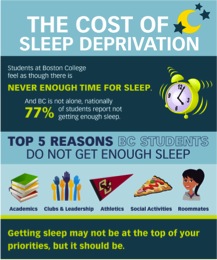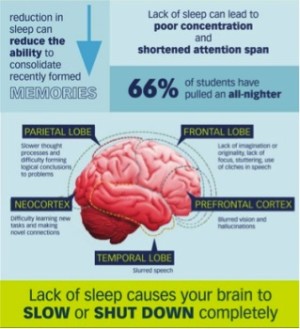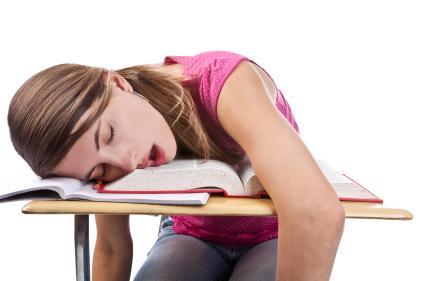Zombies replace students – sleep deprivation in college
April 24, 2015
It’s Monday night around twelve thirty in the morning and Nicole O’Connor is slouched at her desk, somewhere between her laptop and textbooks. With her glasses on and hot chocolate to her right, the college freshman continues to pinch herself in order to stay awake.
In her perpetually exhausted state, Nicole is not along. She knows well that the demands of schoolwork and related activities cripple many college students’ ability to get enough sleep.
“I only get five to six hours of sleep each night because there’s never enough time in the day to get everything done,” said O’Connor.
According to the National Sleep Foundation, seven to nine hours of sleep each night are recommended for young adults, ages 18 to 25 years old.
Frequent lack of sleep over time results in a condition called sleep deprivation.
Shelley Hershner teaches in the Department of Neurology at the University of Michigan.
According to Hershner, “Sleep deprivation consists of chronic partial sleep deprivation, where a student obtains some, but not adequate sleep.”
College is a busy time in life. There are stressful exams, demanding papers, enticing recreational clubs, sports and jobs. The hectic routine results in a deprived sleep cycle.
O’Connor summed up her lifestyle that allows for minimal sleep.
“Homework and studying combined with procrastination formed a habit of staying up late,” said O’Connor.
Even without the habit of procrastination, sleep is constantly jeopardized for young adults.

A mom’s knocking on the door followed by the loud and repetitive “wake up!” every day is experienced by many teenagers.
However, some young adults face a greater challenge falling rather asleep than getting out of bed in the morning. Hershner explains that part of this struggle may be biological.
“Adolescents and young adults feel more awake in the evening, have a difficult time falling asleep until later, and consequently, have insufficient sleep during the school week,” said Hershner.
College is known to be the time of one’s life. But it is also proving to be a time of little sleep. The busy college lifestyle mixed with minimal sleep affects a student’s grades.
In a study done at the University of California at Berkeley, students were shown images and asked to remember those 48 hours later.
According to the study, “Subjects were tested after 35 hours of sleep deprivation; memory performance was approximately two letter grades worse when compared to the non-sleep-deprived subjects.”
The correlation between amount of sleep and energy level is already known. The lack of energy saved for the classroom further illustrates that energy level correlates to intellectual capacity as well.

In 2007, a study was done at Montgomery College in Maryland to discover how sleep time directly affects academic performance.
According to the study, “Napping tended to be more common among high performers.”
Naps allow for some of that lost sleep to be gained back. The study also proved that throughout the nap process, the energy level is increased, and therefore intellectual capacity is as well.
Nicole Ladeau is a junior at American International College and enjoys taking an occasional nap.
“Benefits of taking a nap include feeling more awake after and the ability to focus better,” said Ladeau.
Shelby Kreiger is a student at Holyoke Community College and does not believe there are any benefits to napping.
“Although they might sound like a good idea to a sleep-deprived body,” said Kreiger, “naps never seem to be a good idea because I always feel groggy afterwards.”
Perhaps other lifestyle habits are contributing to sleep deprivation in college.
Within the last decade or so, energy drinks have continued to become popular. Energy drinks have a large amount of caffeine which alerts students and helps to get more work done.
A 2007 study was conducted at East Carolina University to determine the usage of energy drinks by college students and why the drinks are so appealing.
According to the study, “Insufficient sleep was the most common reason to drink energy drinks, as indicated by 67% of energy drink users.”
“I drink energy drinks if I need to be able to stay up later to finish work or study,” said O’Connor.
Although energy drinks may seem like a good idea for the time being, bodies often face a crash once the caffeine begins to wear off.
This crash is accompanied by a great sense of fatigue. To an already exhausted body, this crash results in an overwhelming sense of tiredness.
Ladeau sometimes opts for sleeping pills that are not followed by the crash that energy drinks bring.
“Sometimes I’ll even take Zzzquil and that helps to sleep more,” said Ladeau.
Students are putting chemicals into the body to initiate a body’s natural process. In the long run, a body fighting the natural cycle may lead to more consequences.
“I have both anxiety and depression. But in this case, I think depression has more to do with my lack of sleep,” said Kreiger.
According to Kreiger, “It’s depressing to realize how much responsibility you have and that can keep you up at night.”
Although many college students can admit to being exhausted, the routine of waking up and going to class is helpful in keeping the mind awake.
“In the mornings I feel kind of sluggish,” said O’Connor, “But once the day gets going you are kind of forced to wake up and function decently.”
Though many factors can be blamed for causing sleep deprivation, technology is a growing theory.
According to Hershner, “One of the effects of technology may be to suppress melatonin, resulting in a delay in sleep onset.”
Melatonin is a chemical in the brain that contributes to sleep. Melatonin is even sold as over-the-counter medication to aid the natural sleep process.
There is no doubt that in 2015, Americans are obsessed with technology devices.
The bright lights of the screen may keep the mind more alert while the size of the screen may strain the eyes, resulting in headaches. Not to mention, the constant notifications sent to devices keep a user craving more.
Regardless of the cause of sleep deprivation, educators take notice to more than a student’s plummeting grade.
Mary Ellen Lowney is a Professor of Communication at American International College and usually asks students the reason for looking so tired.
“Sometimes [the tired students] will miss what I said in lecture. That has the potential of making for poor grades,” said Lowney.
The sleepiness is not bound to class times only.
Even though weekends are thought of as being prime time for catching up on sleep, young adults often party Friday and Saturday nights or have obligations early in the morning that hinder resting the body.
The sleep deprivation epidemic is widespread, affecting teenagers as well as young adults. High school can be stressful for students as well but there are not the responsibilities of being independent like there are in college.
According to Kreiger, “I got twice as much sleep in high school.”
Kreiger and O’Connor both dream of nights filled with more sleep after college. Yet, Ladeau knows that a career is just as stressful and she will likely be sleep deprived for many years to come.
Jena McNerney is a recent graduate of Springfield College and is now a teacher at a college preparatory school.
Her advice to current students is to get homework done as soon as it is assigned.
But more important, according to McNerney, “Finish your important work before the weekend!”
The ability to balance social life and the demands of college is a constant struggle, only made worse by procrastination.
“There is a lot going on and students are experiencing freedom for the first time,” said Lowney. “No one is there to tell them to go to bed.”
There are an abundance of lifestyle factors that contribute to sleep deprivation. When a student copes with more than one factor, sleep deprivation is exacerbated and difficult to replenish.
Images courtesy to Boston College and California State University Channel Islands.



